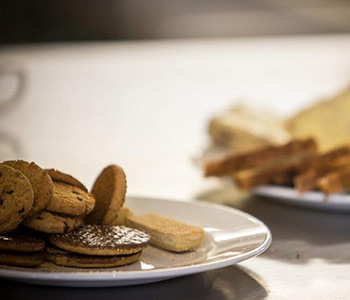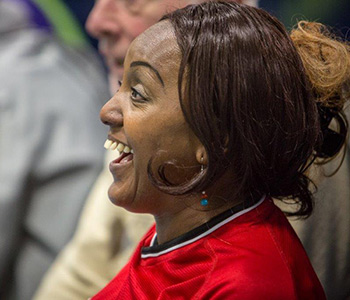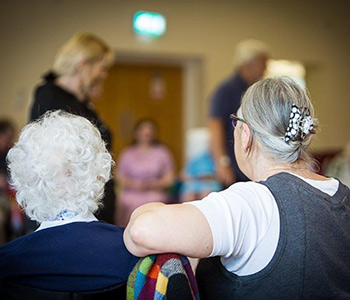I heard something on the radio this week which caught my attention. Claudia Winkleman and her close friend Professor Tanya Byron were guests on the ‘Fortunately ‘podcast which I always follow because it often makes me laugh out loud. Tanya Byron is a well – known Clinical Psychologist who works with children and teenagers. They started talking about Curling.
What on earth can that possibly have to do with a blog about dementia.? Well stay with me and I’ll try to explain.
What Tanya Byron was referring to was the sport of Curling. You may have seen it at the Olympics. In case you’re not familiar with it – it is played in teams of four. The aim is to slide a stone as far as possible along a sheet of ice to the target. It’s like bowls but in Curling you have team members who are directed by the leader to use brushes to clear all obstacles away from the stone as it slides in order to make the surface as smooth and easy as possible.. Are you with me?
Well Tanya Byron, in her work with teenagers, uses the term to describe the behaviour of parents who are doing absolutely everything they can to smooth the path of their child through life to the extent that all problems which are within their control are eliminated. She calls this Curling and believes that the parents would help their children much more by allowing them to make their own mistakes. By making their own mistakes they will learn valuable life lessons. Apparently, this is also called “Snow Plough” parenting.
So, then I thought this sounds familiar. And I remembered about the idea of Learned Helplessness
In dementia care the term is used to describe how, in the early stages following diagnosis, some care partners will relieve the person with dementia of responsibilities and actions far too quickly. Just as in the case of the parent with the teenage child we do this out of love and concern and a desire to protect the person from the consequences of their actions.
I found a fantastic article on this subject published by Alzheimer’s Disease International. It was written in 2012 by a member of Dementia Alliance International – the campaigning organisation for people with dementia which I have talked about before which is partnered with ADI. The author has asked to remain anonymous. Here are some ideas.
“Skills unpractised atrophy at just the time when we most need to continue to maintain them. Too much help teaches people with dementia learned helplessness. We don’t need to learn helplessness; we need to fight it every fraction of an inch along the way.
If this discussion were about physical impairments rather than cognitive ones, this would be obvious. One would not relegate a man walking functionally with a walking stick to riding in a wheelchair. The same is true with loss of cognitive function. Neurones that fire together, wire together. People must continue to let them fire. Research shows that synapses unused are reabsorbed or lost, and dendritic spines proliferate when people are learning. Remembering is part of learning. Whether the task is playing the piano or buttoning one’s shirt, it is simply common sense that people should continue to execute tasks in order to preserve the ability to do so.
The human brain is a learning machine. A self-righting machine. That is at the core of the survival of the species. Instinctively we strive for mastery of skills long after diagnosis. Some of what makes people with dementia exhibit “problem behaviours” is that they continue to want to think and feel independently……..the need to continue to identify ( perceive, recognise, name, relate, remember) using all of one’s senses is PIVOTAL to staying alive”.
There is a real challenge for all of us here. Our own desire to help the person with dementia is based in most cases, on our love. We want to keep them safe. We want to protect them from dangers – real or imagined. We may well be Curling. Using the broom frantically to sweep away all possible difficulties – trying to try to keep one step ahead. This is so natural. Especially if it is your husband or your wife and you have been together for longer than you have been apart. Or your mother or your father who have cared for you all your life and now you want above all to keep them safe and comfortable and somehow look after them in the way they looked after you.
BUT “neurones that fire together wire together”. They will stop firing very quickly if the person is not allowed to perform actions and do things – even if they do need some help to do it. “But it’s so much quicker if I do it” I can almost hear you saying. Yes, it is. But is it more important to save some time than helping those neurones in the person’s damaged brain from continuing to fire? The longer the person is performing tasks, however ‘badly’ the longer they will be meeting a need which is essential to survival.
Makes you think doesn’t it?




